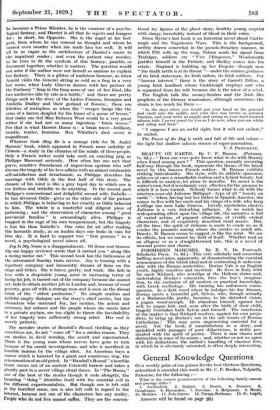FORBIDDEN MARCHES. By E. V. De Fontrnell. Scholartis Press. 7s.
6d.)—This very scholarly and somewhat baffling novel aims, apparently, at demonstrating the essential sensuousness of the Greek ideal and at contrasting it unfavour- ably with the Roman austerities. Dorian Vale is an English youth, highly sensitive and mystical. He lives in Italy with his uncle Richard, who worships at the Hellenic shrine and, undertaking Dorian's education, fires the boy's imagina- tion, to the exclusion of all modern or practical knowledge, with Greek mythology. His training has unforeseen conse- quences. In a dark wood where he indulges his day dreams, Dorian meets a beautiful girl, Sylvia, who, though actually of a Madonna-like purity, becomes, to his distorted vision, a pagan wood-nymph. He abandons himself, against her will, to pagan lust, and, soon after the birth of their child, tragedy overtakes both Sylvia and himself. The conclusion of the matter is that Richard resolves, against his own preju- dices, to bring up Dorian's son in the safe tenets of Roinan Catholicism This may seem unpromising material for a novel. Yet the book, if unsatisfactory as a story, and sprinkled with passages of pure didacticism, is richly per- meated with the spirit of poetry. There is rare charm and distinction in some of its scenes ; and, whether or not we agree with his deductions, the author's handling of classical lore, in which he is obviously saturated, is often deeply interesting.












































 Previous page
Previous page